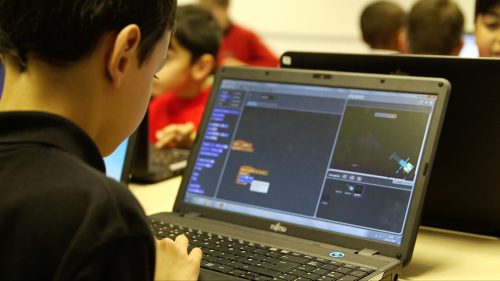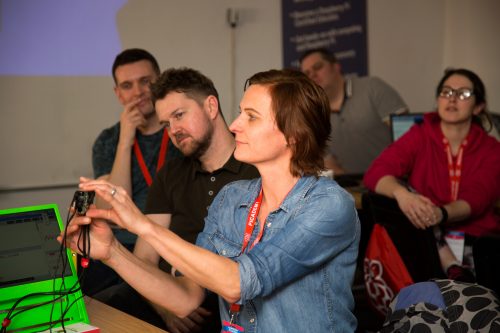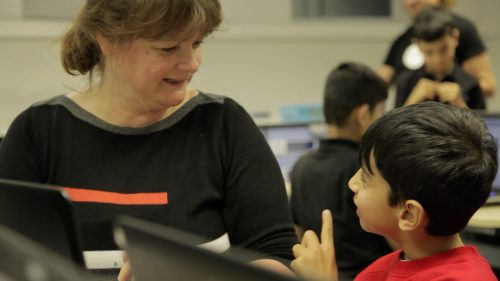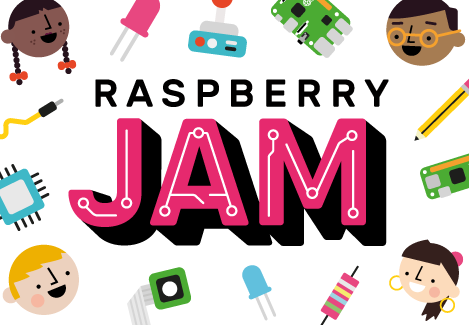Computing in schools: the report card
Today the Royal Society published After the Reboot, a report card on the state of computing education in UK schools. It’s a serious piece of work, published with lots of accompanying research and data, and well worth a read if you care about these issues (which, if you’re reading this blog, I guess you do).
The headline message is that, while a lot has been achieved, there’s a long way to go before we can say that young people are consistently getting the computing education they need and deserve in UK schools.
If this were a school report card, it would probably say: “good progress when he applies himself, but would benefit from more focus and effort in class” (which is eerily reminiscent of my own school reports).

Good progress
After the Reboot comes five and a half years after the Royal Society’s first review of computing education, Shut down or restart, a report that was published just a few days before the Education Secretary announced in January 2012 that he was scrapping the widely discredited ICT programme of study.
There’s no doubt that a lot has been achieved since 2012, and the Royal Society has done a good job of documenting those successes in this latest report. Computing is now part of the curriculum for all schools. There’s a Computer Science GCSE that is studied by thousands of young people. Organisations like Computing At School have built a grassroots movement of educators who are leading fantastic work in schools up and down the country. Those are big wins.
The Raspberry Pi Foundation has been playing its part. With the support of partners like Google, we’ve trained over a thousand UK educators through our Picademy programme. Those educators have gone on to work with hundreds of thousands of students, and many have become leaders in the field. Many thousands more have taken our free online training courses, and through our partnership with BT, CAS and the BCS on the Barefoot programme, we’re supporting thousands of primary school teachers to deliver the computing curriculum. Earlier this year we launched a free magazine for computing educators, Hello World, which has over 14,000 subscribers after just three editions.

More to do
Despite all the progress, the Royal Society study has confirmed what many of us have been saying for some time: we need to do much more to support teachers to develop the skills and confidence to deliver the computing curriculum. More than anything, we need to give them the time to invest in their own professional development. The UK led the way on putting computing in the curriculum. Now we need to follow through on that promise by investing in a huge effort to support professional development across the school system.
This isn’t a problem that any one organisation or sector can solve on its own. It will require a grand coalition of government, industry, non-profits, and educators if we are going to make change at the pace that our young people need and deserve. Over the coming weeks and months, we’ll be working with our partners to figure out how we make that happen.

The other 75%
While the Royal Society report rightly focuses on what happens in classrooms during the school day, we need to remember that children spend only 25% of their waking hours there. What about the other 75%?
Ask any computer scientist, engineer, or maker, and they’ll tell stories about how much they learned in those precious discretionary hours.
Ask an engineer of a certain age (ahem), and they will tell you about the local computing club where they got hands-on with new technologies, picked up new ideas, and were given help by peers and mentors. They might also tell you how they would spend dozens of hours typing in hundreds of line of code from a magazine to create their own game, and dozens more debugging when it didn’t work.
One of our goals at the Raspberry Pi Foundation is to lead the revival in that culture of informal learning.
The revival of computing clubs
There are now more than 6,000 active Code Clubs in the UK, engaging over 90,000 young people each week. 41% of the kids at Code Club are girls. More than 150 UK CoderDojos take place in universities, science centres, and corporate offices, providing a safe space for over 4,000 young people to learn programming and digital making.
So far this year, there have been 164 Raspberry Jams in the UK, volunteer-led meetups attended by over 10,000 people, who come to learn from volunteers and share their digital making projects.
It’s a movement, and it’s growing fast. One of the most striking facts is that whenever a new Code Club, CoderDojo, or Raspberry Jam is set up, it is immediately oversubscribed.
So while we work on fixing the education system, there’s a tangible way that we can all make a huge difference right now. You can help set up a Code Club, get involved with CoderDojo, or join the Raspberry Jam movement.




15 comments
Martin Gatehouse
I took £25k of CAS money and left accounting practice and retrained as a CS teacher at Reading Uni in 2014/15. During my NQT year a 6th form pupil discovered some confidential staff salary data on the school network during one of my classes. I was set home whilst various allegations were being investigated, with a possible disciplinary process to follow. For £24k salary? I don’t think so! Back to accountancy I went. holding on to teachers you have already got would be a good step…
Andrew Oakley
I think one of the biggest problems is that teaching computing doesn’t pay nearly as well as actually doing computing, so if you have computing skills and aren’t independently wealthy, teaching isn’t the obvious choice. Ergo there is a huge shortage of computing teachers; roughly half of all secondary schools don’t even offer computing GCSE. I’d love to teach computing to children and teenagers as my main job, but my family of five couldn’t cope with the 25k drop in family income – and that’s out in the provinces; if I were working close to London the gap would be even bigger. As it is, I do my best by running a Raspberry Jam with 150 attendees, but it’s a drop in the ocean.
We need to tell some honest truths here. Despite what the unions would have us believe, an art teacher’s marketable value is not the same salary as a computing teacher. Not even close, and some special grants of only a few thousand pounds aren’t anywhere near enough to make up the difference. We will not solve this problem until we have put an end to national pay bargaining for teaching and stopped treating all teachers as being in equal demand.
Robert Alderton
Andrew you may be correct with regard teacher pay, in that it certainly does not compare with private sector tech industry rates. However, you are being somewhat short sighted with regard differentials for subjects being taught. On the surface an Art teacher may seem worth less than a computing teacher. However we need designers, and that creativity starts with Art. You could say the same about tech writers, that start with English Language Arts, and mechanical Engineers that start with Shop class. All teachers are important. The bigger question is how much value do we as society want to invest in the best teachers for our next generation.
Gervase Markham
Robert: you confuse importance with monetary value. I don’t think Andrew is saying that teaching Art is less important than teaching ICT, he’s saying that those with the skills to teach ICT have other options which pay much better, and perhaps those who teach Art don’t. The monetary value of a skill is what someone will pay for it; if other options for the computer-literate are paying much better than ICT teaching, then we’ll have a shortage of ICT teachers. That’s not to judge the relative importance of two subjects, it’s just economics.
Andrew is right: a pretence that the skills necessary to teach all subjects are of equal monetary value (i.e. that every teacher has the same range of alternative careers with the same potential income) is ridiculous. As is the idea that skills are evenly distributed around the country. And yet that’s what national pay bargaining imposes. Attempting to control markets leads to mismatched supply and demand, in one direction or the other.
*just*_a_human
“it’s just economics.”
nothing exists in isolation
=s
Alan Kirk
There a lot of retired people like myself whose knowledge of ‘computing’ coding and electronics could be passed on to children,teenagers and rather than being the ‘drivers’ of tablets, game machines, phones etc. they could become the app developers, coders and inventors of technology for the 21st century and make wads of money for UK and themselves. So get some registers of those people and utilise their knowledge which they are anxious to pass on.
This could be voluntary or with some salary
There would be no need to make a £60k programmer suffer then.
*just*_a_human
“and make wads of money for UK and themselves.”
something something
infinite growth on a finite planet
David Carne
I endorse all that Tony Goodhew has said; we obviously followed a very similar career path. I retired in 2002 frustrated with the lack of understanding of what computing should be about coming from senior management wanting to scrap the then ‘A’ level Computer Science in favour of just ICT at GCSE, it has proved a disastrous decision, but most schools seemed to have done the same. Note the introduction to the Raspberry Pi User Guide written by Eben Upton which outlines succinctly the demise of real computing in schools since the year 2000 and it’s consequence.
With Raspberry Pi and Code Clubs we have hope. I see a parallel here with the start of popular computing in the mid 1970’s when I ran an Amateur Computer Club, very much for adults at which we built our own microcomputers using the Motorola 6800 and the Zilog Z80 and started programming in BASIC. There was real enthusiasm and this enthusiasm hopefully I passed on to my pupils when I began teaching the then Computer Studies at ‘O’ level in 1975. Certainly all those I taught Real Computing to, including in depth computer programming who then went on to study Computer Science at university, whom I have since seen, have successful computing careers; many having started their own businesses. They would not have done so just learning ICT.
However and there is always a ‘but’, teacher’s pay as mentioned by Andrew Oakley is going to be a problems. My son is in commercial computing and earning three times what he would get as a teacher. One of my daughters is a lecturer in a college who came to me the other day and said ‘Dad, I want to get into computing because I can earn three times as much as I get teaching’; she is on the road to becoming a computer programmer. I rest my case!
Tony Goodhew
Unfortunately, there are still far too many heads of schools who do not understand the value of coding. Many also resent the costs of suitable equipment needed to teach coding effectively.
I trained as a Maths/Physics teacher in the early sixties and began teaching computing/programming in 1968. I took advantage of the many, free computing courses available and was a teacher trainer for the BBC Micro in Cambridgeshire. I later completed a MSc in Computer Education at Loughborough University. I moved schools three times in my career, in each case to find a more computing friendly head, who would allow me to spend more time teaching coding to upper secondary/post 16 students. Each time when the Principal of the college moved on they were replaced with school leaders having little understanding of, or sympathy for, STEM subjects (backgrounds in Humanities and Languages) and they timetabled me away from full time Computing teaching during the school day. Luckily for me, I was able to teach Computing to adults in the evenings.
I retired several years ago but still enjoy writing code for Pis, Arduinos and Micro:Bits and help with Raspberry Jams. None of the local primary schools where I live in Leicestershire have code clubs and the secondary does not offer Computing.
All students should have opportunities to develop coding skills and teachers willing to teach coding need even more support.
Neil Chappell
All three of the previous comments are true in there own right in the points they make, teachers pay in my opinion being a main one for all teachers.
In my local area i run three code clubs and the kids love it, some are on their third year of code club but the main bug bear for me is equipment and funding for the subject in general.
For one school i actually teach for them once a week computer science for KS2 as most schools it seems only really just do the basics to tick all the boxes.
We really need to as community to try and get these schools to teach it so they understand how valuable it is for all of the students..
tim Rowledge
90,000 kids involved in codeclubs sounds pretty good but according to (https://www.gov.uk/government/uploads/system/uploads/attachment_data/file/552342/SFR20_2016_Main_Text.pdf) there are more than 3 million secondary and 4.6 million primary students to reach.
So still about about 98% outreach to go. That’s a *lot* of work. I really wish that governments (and the voters, who are ultimately responsible) would understand that whilst education is expensive, ignorance is fatal.
Dr Mike Reddy
Am reminded of the ending to School of Rock, where (spoilers) Jack Black evolves into extra-curricular activities. That way IT Pros could take part without losing their Industry salaries. Alternatively, we in HE should step up to the plate. Call it outreach, and our marketing departments will thank us!
Bestia
Is there nothing regarding grades or grading policy in the teacher or parent or student handbook? Is there a grading policy, or anywhere by the board or something in regards to grades/ grading? In Texas public schools an administrator is not allowed to ask or force a teacher to change a student’s grade on an assignment, test, report card, etc. Because of that my school adopted a grading policy which said teacher had to allow students to retake assignments among other stuff I don’t remember. If anyone questioned a report card/ progress report grade we had to be able to show documentation showing we followed the grading policy. Many kids who had low grades had behavioral problems and refused to do the retakes, or even the original assignments.
Can you offer the students in question extra credit? To redo the failed assignments? Give them opportunities to fix their low grades and earn better grades.
It really sucks as teachers we are blamed for students poor grades. Parents forget their children earn their grades and teachers don’t give out grades arbitrarily.
Danny Hock
The knowledge of retired persons like me could be passed on to to children, teenagers and rather than being the ‘drivers’ of tablets etc. Rather than learning from others, we could provide them the home and true environment so that can learn the coding to become app developers.
This could be voluntary or with some salary.
Alex Bate
Danny, you should look into Code Club. This fits perfectly with what you’re suggesting. You’ll find more information on Code Club in your area here: https://www.codeclubworld.org/